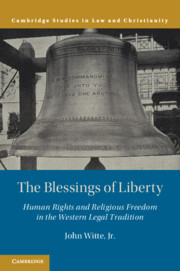Book contents
- The Blessings of Liberty
- Law and Christianity
- The Blessings of Liberty
- Copyright page
- Dedication
- Epigraph
- Contents
- Preface and Acknowledgments
- Introduction
- 1 Christian Contributions to the Development of Rights and Liberties in the Western Legal Tradition
- 2 Magna Cartas Old and New
- 3 Natural Law and Natural Rights in the Early Protestant Tradition
- 4 “A Most Mild and Equitable Establishment of Religion”
- 5 Historical Foundations and Enduring Fundamentals of American Religious Freedom
- 6 Balancing the Guarantees of No Establishment and Free Exercise of Religion in American Education
- 7 Tax Exemption of Religious Property
- 8 Faith in Strasbourg?
- 9 Meet the New Boss of Religious Freedom
- Concluding Reflections Toward a Christian Defense of Human Rights and Religious Freedom Today
- Index
5 - Historical Foundations and Enduring Fundamentals of American Religious Freedom
Published online by Cambridge University Press: 28 October 2021
- The Blessings of Liberty
- Law and Christianity
- The Blessings of Liberty
- Copyright page
- Dedication
- Epigraph
- Contents
- Preface and Acknowledgments
- Introduction
- 1 Christian Contributions to the Development of Rights and Liberties in the Western Legal Tradition
- 2 Magna Cartas Old and New
- 3 Natural Law and Natural Rights in the Early Protestant Tradition
- 4 “A Most Mild and Equitable Establishment of Religion”
- 5 Historical Foundations and Enduring Fundamentals of American Religious Freedom
- 6 Balancing the Guarantees of No Establishment and Free Exercise of Religion in American Education
- 7 Tax Exemption of Religious Property
- 8 Faith in Strasbourg?
- 9 Meet the New Boss of Religious Freedom
- Concluding Reflections Toward a Christian Defense of Human Rights and Religious Freedom Today
- Index
Summary
The eighteenth-century American founders believed that religion is special and deserves special constitutional protection, and that all peaceable faiths must be drawn into the constitutional process and protection. The founders introduced six constitutional principles for the protection of religious freedom – freedom of conscience, free exercise of religion, religious pluralism, religious equality, separation of church and state, and no federal establishment of religion. Since the 1940s, the US Supreme Court has upheld these religious freedom principles in more 170 cases, albeit unevenly of late. Moreover, in recent years religious freedom has come under sharp popular and academic attack, particularly as religious pathologies have come to light and religious freedom claims have clashed with sexual liberty claims. This chapter calls for a return to the first principles of religious freedom for all, at home and abroad, and for a new balance between religious freedom and other fundamental rights claims.
Keywords
- Type
- Chapter
- Information
- The Blessings of LibertyHuman Rights and Religious Freedom in the Western Legal Tradition, pp. 138 - 170Publisher: Cambridge University PressPrint publication year: 2021

